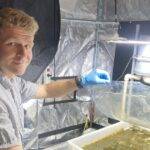Main Points In Hindi (मुख्य बातें – हिंदी में)
-
जीन-संपादन में सीआरआईएसपीआर का उपयोग: एशिया और अफ्रीका में कृषि वैज्ञानिक उच्च उपज वाली और रोग प्रतिरोधी फसल किस्मों के विकास के लिए CRISPR-Cas9 जैसे जीन-संपादन उपकरणों का तेजी से उपयोग कर रहे हैं, जबकि इसके पेटेंट और लाइसेंसिंग नियमों की अनदेखी की जा रही है।
-
भारतीय पेटेंट कानून: भारतीय शोधकर्ताओं को 2022 से CRISPR-Cas9 का कानूनी रूप से उपयोग करने की अनुमति मिली है, जब ERS Genomics को टूल पर स्थानीय पेटेंट मिला। हालांकि, वैज्ञानिक सीआरआईएसपीआर का शैक्षणिक उपयोग कर सकते हैं, लेकिन व्यावसायिक लाभ नहीं उठा सकते।
-
ट्रांसजेनिक फसलों की चुनौतियाँ: भारत में बीटी कपास जैसे ट्रांसजेनिक फसलों का विकास विदेशी डीएनए पर निर्भर रहा है, जिसके कारण भारतीय किसान महंगे स्वामित्व वाले बीजों पर निर्भर हो गए हैं और राज्य-अनुदानित बीजों का लाभ नहीं उठा सके।
-
पेटेंट का महत्व: कृषि वैज्ञानिकों को CRISPR-Cas9 पेटेंट की स्वामित्व स्थिति और इससे जुड़े लाइसेंस शर्तों की गंभीरता का ध्यान रखना चाहिए, जिससे उन्हें अपने शोध के सफल व्यावसायीकरण में मदद मिले।
- संशोधित बीजों का विकास: भारत के कृषि मंत्रालय ने जलवायु-लचीला और जैव-फोर्टिफाइड बीज किस्मों के विकास के लिए 5 अरब रुपये की योजना शुरू की है, लेकिन पेटेंट टूलकिट पर निर्भरता वैज्ञानिकों के समय को बर्बाद कर सकती है यदि वे अपने शोध उत्पादों को बाजार में नहीं ला सकें।
Main Points In English(मुख्य बातें – अंग्रेज़ी में)
Here are the main points derived from the provided text:
-
Use of CRISPR in Agriculture: Scientists in Asia and Africa are rapidly using the CRISPR gene-editing tool to develop disease-resistant, high-yield crop varieties, but the importance of patents and licensing associated with such tools is often underestimated, particularly in government research laboratories.
-
Patent Ownership and Limitations: Patent holders of the CRISPR-Cas9 system have rights to discoveries made with it, which can limit the commercialization of scientific successes. In India, since 2022, researchers can legally use this system, but they are restricted from commercializing any resulting innovations due to licensing rules set by the patent holder.
-
Challenges in Transgenic Crop Development: Historical challenges in developing transgenic crops, such as Bt cotton, highlight the impact of intellectual property rights on agricultural innovation. Patent restrictions led to expensive proprietary seeds, which disadvantaged farmers and limited their access to beneficial crop varieties.
-
Call for Awareness on Patents: The author urges scientists in low- and middle-income countries to pay close attention to who owns CRISPR-Cas9 patents and the licensing conditions to avoid past mistakes where research did not translate into practical benefits for farmers.
- Investment in Crop Research: The Indian government has initiated a significant investment plan aimed at expanding genome-editing research for climate-resilient and biofortified seed varieties. However, reliance on patented tools without potential for commercialization could result in wasted research efforts for scientists.


Complete News In Hindi(पूरी खबर – हिंदी में)
एशिया और अफ्रीका में कृषि वैज्ञानिक तेजी से रोग प्रतिरोधी, उच्च उपज वाली फसल किस्मों को विकसित करने के लिए जीन-संपादन उपकरण सीआरआईएसपीआर का उपयोग कर रहे हैं। कई, विशेष रूप से सरकारी अनुसंधान प्रयोगशालाओं में, सीआरआईएसपीआर जैसे उपकरणों से जुड़े पेटेंट और लाइसेंसिंग नियमों के महत्व को कम करके आंका जा रहा है।
CRISPR-Cas9 प्रणाली पर पेटेंट धारकों के पास इससे की गई खोजों पर अधिकार है, क्योंकि उनका आविष्कार उन खोजों को संभव बनाता है। भारतीय शोधकर्ता 2022 से कानूनी रूप से CRISPR-Cas9 का उपयोग करने में सक्षम हैं, जब भारतीय पेटेंट कार्यालय ने डबलिन स्थित कंपनी ERS Genomics को टूल पर एक स्थानीय पेटेंट प्रदान किया। ईआरएस उपकरण के उपयोग के नियम निर्धारित करता है। परिणामस्वरूप, वैज्ञानिक शैक्षणिक उद्देश्यों के लिए सीआरआईएसपीआर का उपयोग कर सकते हैं, लेकिन किसी भी परिणामी वैज्ञानिक सफलता का व्यावसायीकरण नहीं कर सकते।
सीआरआईएसपीआर इलाज और कैंसर के टीके: शोधकर्ता उन्हें बाजार में लाने में मदद कर सकते हैं
कृषि में, यह एक समस्या है। 1997 में अपना करियर शुरू करते समय मैंने ऐसी ही गलती की थी। भारतीय कृषि अनुसंधान परिषद (आईसीएआर) में एक जैव प्रौद्योगिकीविद् के रूप में, मुझे आनुवंशिक रूप से संशोधित, कीट-प्रतिरोधी बीटी कपास विकसित करने के लिए परियोजना के प्रमुख जांचकर्ताओं में से एक के रूप में नियुक्त किया गया था।
बीटी कपास जैसी ट्रांसजेनिक फसलों के उत्पादन में विदेशी डीएनए को शामिल करना शामिल है – इस मामले में, जीवाणु से जीन बैसिलस थुरिंजिएन्सिस (इसलिए ‘बीटी’) – वांछित लक्षणों को प्रेरित करने के लिए फसल के जीनोम में। भारतीय वैज्ञानिकों ने 2000 के दशक में ट्रांसजेनिक फसलों पर बहुत सारे शोध प्रकाशित किए, लेकिन संबंधित बीटी जीन पर पेटेंट एग्रोकेमिकल कंपनी मोनसेंटो (अब जर्मनी के लीवरकुसेन में बायर के स्वामित्व में) के पास था, जिसने शोध परिणामों के व्यावसायिक उपयोग की अनुमति नहीं दी थी। . अंततः, भारतीय किसान राज्य-अनुदानित बीज किस्मों का लाभ नहीं उठा सके; बीटी कपास का उपयोग करने वाले अब महंगे स्वामित्व वाले बीजों पर निर्भर हैं।
एक असफल परियोजना को देखने के बाद, मैं निम्न और मध्यम आय वाले देशों के वैज्ञानिकों से इस बात पर अधिक ध्यान देने का आग्रह करता हूं कि CRISPR-Cas9 पेटेंट का मालिक कौन है और वे किन शर्तों के तहत इस नवाचार को लाइसेंस देने के इच्छुक हैं।
‘ChatGPT for CRISPR’ नए जीन-संपादन उपकरण बनाता है
उदाहरण के लिए, भारत के कृषि मंत्रालय ने 5 अरब रुपये (60 मिलियन अमेरिकी डॉलर) की योजना शुरू की है। जीनोम-संपादन अनुसंधान का विस्तार करने की पहल जलवायु-लचीला और जैव-फोर्टिफाइड बीज किस्मों का विकास करना। भारत में वैज्ञानिक जो अपने शोध उत्पादन को बढ़ाने के लिए पेटेंट टूलकिट पर भरोसा करते हैं, अगर वे बीज नहीं बेचे जा सके तो उनका समय बर्बाद होगा।
भारत के पास पहले से ही चीन और संयुक्त राज्य अमेरिका जैसे देशों की तुलना में कम सीआरआईएसपीआर पेटेंट हैं। पेटेंट-संरक्षित सीआरआईएसपीआर टूलकिट के पूर्ण उपयोग के लिए वाणिज्यिक लाइसेंस प्राप्त करना महंगा हो सकता है। उदाहरण के लिए, 2023 में, बोस्टन, मैसाचुसेट्स में वर्टेक्स फार्मास्यूटिकल्स ने सिकल सेल रोग के लिए अपने सीआरआईएसपीआर-आधारित उपचार को बेचने की मंजूरी हासिल की। फीस के रूप में $50 मिलियन का अग्रिम भुगतान करने के बाद ही ब्रॉड इंस्टीट्यूट, कैम्ब्रिज, मैसाचुसेट्स में एक जीनोमिक-अनुसंधान केंद्र द्वारा अधिकृत लाइसेंस-धारक, जो पेटेंट रखता है।
Complete News In English(पूरी खबर – अंग्रेज़ी में)
Agricultural scientists in Asia and Africa are rapidly using the gene-editing tool CRISPR to develop disease-resistant, high-yield crop varieties. However, the importance of patent and licensing rules associated with tools like CRISPR is often underestimated, especially in government research labs.
The patent holders of the CRISPR-Cas9 system have rights to the discoveries made using it, as their invention enables those findings. Since 2022, Indian researchers have been legally allowed to use CRISPR-Cas9 after the Indian Patent Office granted a local patent to Dublin-based company ERS Genomics for this tool. ERS sets the rules for using the tool. Consequently, scientists can use CRISPR for academic purposes, but they cannot commercialize any resulting scientific breakthroughs.
CRISPR Treatments and Cancer Vaccines: Researchers Can Help Bring Them to Market
In agriculture, this situation poses a problem. When I started my career in 1997 as a biotechnologist at the Indian Council of Agricultural Research (ICAR), I made a similar mistake. I was appointed as one of the lead investigators developing genetically modified, pest-resistant BT cotton.
Creating transgenic crops like BT cotton involves inserting foreign DNA – in this case, a gene from the bacterium Bacillus thuringiensis (hence ‘BT’) – into the crop’s genome to encourage desired traits. Indian scientists published much research on transgenic crops in the 2000s, but the relevant BT gene was patented by the agrochemical company Monsanto (now owned by Bayer in Leverkusen, Germany), which didn’t allow commercial use of those research results. Ultimately, Indian farmers could not benefit from state-funded seed varieties; instead, they became reliant on expensive proprietary seeds for BT cotton.
After witnessing this failed project, I urge scientists from low and middle-income countries to pay closer attention to who owns the CRISPR-Cas9 patents and under what conditions they are willing to license this innovation.
‘ChatGPT for CRISPR’ Creates New Gene-Editing Tools
For example, India’s Ministry of Agriculture has launched a plan worth 5 billion rupees (60 million USD) to expand genome-editing research to develop climate-resilient and bio-fortified seed varieties. If scientists in India rely on patented tools to enhance their research outcomes but cannot sell the seeds, their efforts will be wasted.
Compared to countries like China and the United States, India already has fewer CRISPR patents. Obtaining a commercial license for full use of patent-protected CRISPR tools can be expensive. For instance, in 2023, Vertex Pharmaceuticals in Boston, Massachusetts obtained approval to sell a CRISPR-based treatment for sickle cell disease only after making an upfront payment of $50 million to a license holder authorized by the Broad Institute, a genomic research center in Cambridge, Massachusetts that holds the patent.




